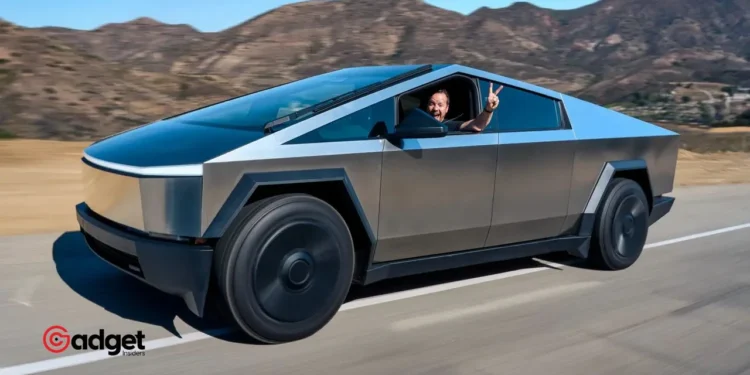Tesla’s groundbreaking Cybertruck has been turning heads since its debut, but it’s not just its unique design that’s drawing attention. The electric vehicle (EV) maker’s strict resale policy has become a topic of heated discussion, especially following a recent incident involving a Cybertruck owner who found himself in a bind.

The Struggle of Fitting In: A Cybertruck Owner’s Tale
When Size Does Matter
Blaine Raddon, an eager new owner of a Tesla Cybertruck, faced an unexpected issue when he discovered that his new vehicle couldn’t fit inside his residential building’s parking structure. Left with a truck he couldn’t park at home, Raddon made the logical decision to sell it. However, this seemingly straightforward solution was met with resistance from the company due to a specific clause in the Cybertruck’s sales contract.
Navigating Tesla’s No-Resale Policy
Tesla, in anticipation of potential scalping due to the Cybertruck’s popularity, had implemented a no-resale clause that restricts owners from selling the vehicle within the first year of ownership, unless the EV giant itself is the buyer or expressly agrees to the transaction.
Owners attempting to bypass this clause face hefty fines and even a potential ban from purchasing future models. Despite these measures, legal experts have raised doubts about the enforceability of such fines, and the market has seen several Cybertrucks resold at high prices, sometimes exceeding $250,000.

Legal and Market Implications of Tesla’s Resale Restrictions
A Cooling Market
As Tesla ramps up Cybertruck production, the initial frenzy that drove up resale prices is beginning to wane. The company itself has shown less interest in repurchasing the trucks, likely focusing on selling its current production without the added complexity of managing buybacks.
This shift has left some owners, like Raddon, in a difficult position, as selling the vehicle becomes less straightforward without the company’s cooperation.
A Shift in Tesla’s Buyback Strategy
Previously, Tesla offered to buy back Cybertrucks at a fair market price, accounting for depreciation at $0.25 per mile driven. However, recent trends suggest a move away from this practice, further complicating the resale process for current owners.
This change may be strategic as the EV brand prepares to phase out the more expensive Foundation Series models in favor of the regular, more affordably priced versions.

What Lies Ahead for Cybertruck Owners and Tesla?
The Future of Electric Pickup Ownership
The Cybertruck saga presents a unique case study in the challenges of innovative vehicle ownership and the legal intricacies of resale restrictions. As more consumers opt for electric vehicles, the industry’s approach to such policies will need to evolve to accommodate the practical realities faced by owners.

Potential Changes in Consumer Rights and Manufacturer Policies
For Tesla and other automakers exploring similar policies, the balance between controlling the brand’s market and respecting consumer rights remains delicate. As the automotive industry continues to innovate, how companies manage these dynamics will likely set precedents that affect not only current but future models of electric vehicles.
While Tesla’s Cybertruck continues to capture the imagination with its futuristic design and impressive capabilities, the complexities of its resale policy highlight the growing pains associated with introducing groundbreaking technology to a conventional market.
For owners like Blaine Raddon and potential buyers, understanding these policies is crucial as they navigate the exciting yet challenging landscape of modern EV ownership.










